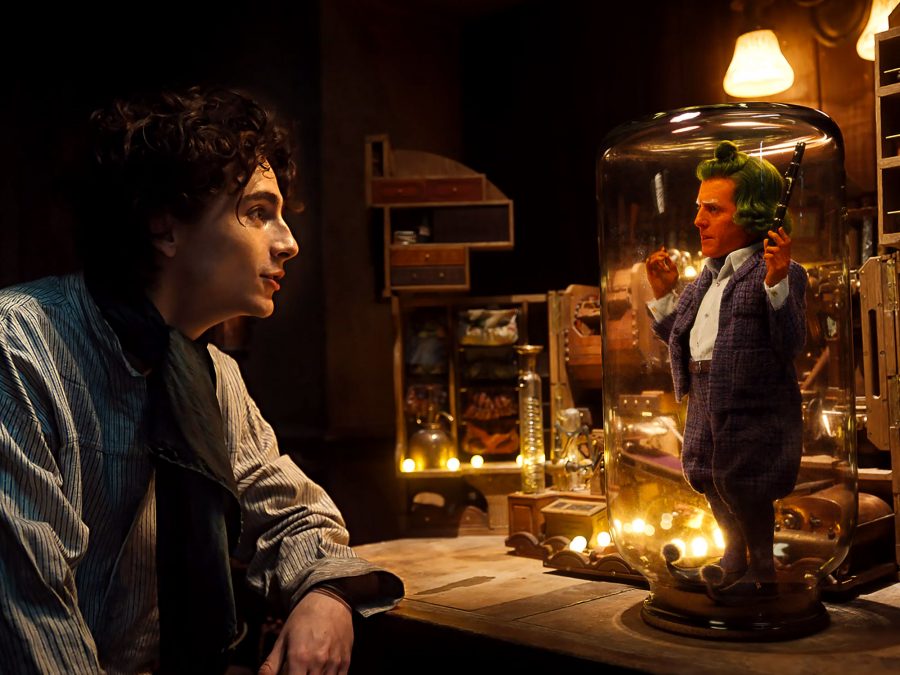As we rapidly approach the end of what has been something of an annus horribilis for the humble blockbuster (Barbenheimer notwithstanding), and following on from months of bitterly contested strike action that brought Hollywood to a standstill, it’s no exaggeration to say that the film industry’s hopes and expectations for Wonka are higher than a group of kids hopped up on fizzy lifting drinks.
Praise be, then, to director Paul King and his longtime writing partner Simon Farnaby. Not content with serving up a pair of near-perfect Paddingtons, the duo have concocted something even sweeter and more surprising this time around. A prequel of sorts, Wonka is first of all a visual marvel in which the CGI is seamlessly blended with eye-popping practical effects that defy explanation. It might just be the most technically astounding capitalist origin story since Citizen Kane.
This is a film that has been double dipped in lavish spectacle and then generously sprinkled with all the charm, silliness and wit found in Roald Dahl’s source novel. Yet it also contains a progressive message and is tempered with a distinctly modern sensibility (gone are the colonial overtones of the book) that is at once belied by the quasi-Dickensian setting, retro-styled costumes and steam-powered production design.
Dahl’s oddball protagonist is imagined by King and Farnaby as a younger, sprightlier and more wholesome version of himself. He’s introduced as an idealistic entrepreneurial wunderkind who moves to the big city to realise his dream of opening his own chocolate shop, only to be waylaid by an exploitive innkeeper (Olivia Colman) and her buffoonish lackey (Mathew Baynton), and hindered further by a greedy priest (Rowan Atkinson) and a still greedier police officer (Keegan-Michael Key), who are in cahoots with a trio of unscrupulous confectionery tycoons (played by Paterson Joseph, Matt Lucas and Matthew Baynton).

Timothée Chalamet is simply sensational in the title role, taking a character previously immortalised on screen by Gene Wilder (and later cartoonified by Johnny Depp) and making it entirely his own. He may not possess the razzle-dazzle showmanship required to pull off some of the film’s more dynamic musical numbers, but Chalamet’s personality more than makes up for his lack of trad theatrical chops. And while this may be a more sanitised and sincere Wonka than we’ve seen before, crucially Chalamet is never afraid to get weird with it.
Speaking of which, (top) hats off to Hugh Grant for continuing his recent run of scene-stealing comedic supporting turns. As an ostracised Oompa-Loompa who stalks Wonka seeking compensation for some stolen cocoa beans, Grant is a totally tangoed delight, and is quickly becoming King’s secret weapon. Elsewhere, fellow Paddington alum Sally Hawkins makes a brief but affecting cameo as Wonka’s absent mother, while Atkinson and Key get big laughs playing the aforementioned cleric and cop.
If the physical appearance of the Oompa-Loompa is the most conspicuous callback to Mel Stuart’s 1971 film Willy Wonka & the Chocolate Factory, it’s the original compositions by Leslie Bricusse and Anthony Newley to which King’s film owes the biggest debt. Indeed, the newly written songs for Wonka, brilliantly orchestrated and performed though they are, don’t really linger beyond the instant sugar-rush gratification that hits you in the moment. For a film so steeped in nostalgia, however, perhaps it’s fitting that you’re more likely to leave humming a familiar tune.
Little White Lies is committed to championing great movies and the talented people who make them.
ANTICIPATION.
It’s the most Wonkaful time of the year. 4
ENJOYMENT.
A deliriously entertaining, gloriously hand-crafted musical triumph. 4
IN RETROSPECT.
Chalamet’s performance sticks in the mind even if the new songs don’t. 4
Directed by
Paul King
Starring
Timothée Chalamet, Hugh Grant, Olivia Colman
The post Wonka review – Timothée Chalamet is simply sensational appeared first on Little White Lies.
from Little White Lies https://ift.tt/uUfK7Sx
via IFTTT


0 Comments